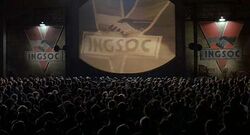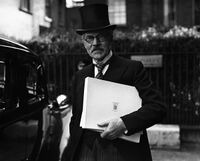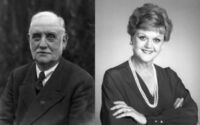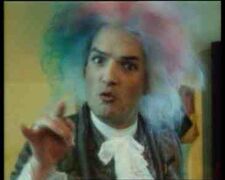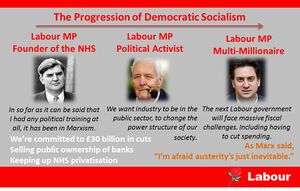Labour Party (UK)
“When they realise that all the tides of history are flowing in our direction, that we're not wrong, that we represent the future, then they will understand that they are the ones who need to change views.”
The British Labour Party is a political organisation that believes winning General Elections is a betrayal of the working class in a capitalist system. It was formed in the dark days of the early 20th-century in order to hand inconceivable amounts of power to trade union leaders and sympathetic aristocrats, who represented the interests of their stable jobs and the money it provided, rather than the disgruntled Marxist agitators who didn't write the party's history book.
Thus, the party was formed on the basis of saying radical stuff, getting an award for it and then supporting a huge world war fought to make the world safe for imperialism. The New Labour Era was the pinnacle of these founding ideals, with Tony Blair getting elected on a radical platform, getting rewarded with the position of Middle East Peace Envoy, and then supporting the War in Iraq.
Labour's symbols in the past have included the Red Flag, the White Flag, and a red rose — a symbolic reference to the magic money tree under which the party was first created in 1900.
History
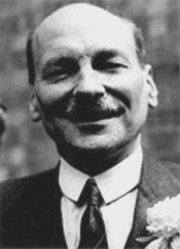
Founding
The Independent Labour Party was formed in the 1870s and was led by Kier Hardon, who was a jolly man with a hearty laugh, a generous smile[1] and yet existed a whole century before celebrity pedophiles evolved. In the 1895 election Labour put up 28 candidates, winning 44,325 votes and yet not gaining a single seat. This begun one of the core Labour policies, that has been in the Labour Manifesto since that election, which is that the voting system is biased towards the other parties. It also begun the Labour Party's tradition of excusing their electoral defeat on the stupidity of the voters.
Hardon was a great believer in uniting the left, especially under his principles. He despised the Marxists in the Social Democratic Federation and the anarchists in their nurseries who would not give up their ideals and join his party.
Formation
The Labour Party was officially formed in 1900, as the Labour Reformist Conclave and later changed to British Manual Labour Party of Workers, Peasants and Guardian Readers in an attempt to show there was more to the left than Marxism, though they ended up showing that they were more to the right than Marxism. It was led by Ramsay MacDonald, who narrowly beat his brother, Ronald in the Leadership election. Dismayed at losing to his younger brother, Ronald tweaked his surname and moved to the US in search of a better life. Despite not having prepared to fight an election, they managed to prevent two out of fifteen of their candidates from eating a bacon butty in front of a camera and so were given two MPs. This tactic was then re-used by Labour's campaign department to fight the 2015 General Election.
From then on, MacDonald and his party consistently managed to persuade workers to limp to the polling station every five years whilst under the torment of policeman's batons in order to cast a vote for a party that represented their representatives' interests. Promises were made of a better society that was run to favour the working class. These promises were then cast in stone and the stone subsequently lost in south coast seaside resort car parks. Soon, the original workers who had voted Labour died off. In their place, a new generation of workers came to the forefront to express their desire for a better life — or failing that, that power and money at least come streaming towards union officials and Labour politicians.
Rise to prominence
Gathering momentum, the Labour Party engaged the Liberal Party and began making compromises here, there, and everywhere. After sacrificing most of its mere principles for authentic gambits, Labour soon had its first cabinet seat, as the Liberal Party appointed Arthur Henderson to its war cabinet, who supported killing off the working class of not only Britain but France, Germany, Russia, Italy, and Austria as well.
Not every member of the Labour Party was happy and some on the left of the party affiliated with the British Socialist Party. They gave a voice to those who opposed conscription and would rather see the workers die building canals too narrow to fit ships through. They did this with a series of strikes. Every time the government misbehaved, it was given a strike. If the government were to reach three strikes, it was given a detention and asked to write out excuses for the imperialist nature of the First World War one hundred times over.
The Labour Party finally got into government in 1924, a year in which every other party was actually perceived as worse for once. The Conservative Party was technically the winner, but couldn't form a majority. So, with less than a third of the seats in the House of Commons, the Labour Party nervously climbed into the driver's seat. The Liberal Party helped them get used to the controls and constantly warned them not to think of doing anything really radical. This was never an issue, as Labour were too distracted by His Majesty's imperial gear stick. MacDonald's government began with crushing labour strikes on the basis that the strikes were anti-Socialist in nature, as the government was now socialist itself and should be the organiser of any strikes that were to occur.
The government collapsed after nine months, leading to another general election in the same year. The Daily Mail exposed the Labour Party's complete irrelevance with the Zinoviev Letter, which called for a Communist revolution in Britain, leading many Conservative MPs to claim that the Labour Party were in bed with Lenin. In fact, Lenin was hiding under the bed, and the Labour Party's policymaking was a muddy river bed.
A second spell in government came about between 1929 and 1931, as did a complete collapse of the economy, which the right wing were quick to unfairly blame on Labour. In fact, the cause of the crisis was Ronald McDonald, who was safely in the US and with Millions Served Daily. The 1931 election reduced the Labour Party's total from 277 seats to a very cohesive 52, a tad lower even than the number the Liberal Democrats achieved in their prime.
Murder He Wrote
With every other Labour party leader defecting or dead, the confused comrades turned to George Lansbury as their leader. An ancient throwback to another era with mutton chop whiskers and a waistcoat with a pocket watch, Lansbury was chosen to advance the party to the mid Victorian era. Lansbury was a feminist and a pacifist and was always out of pocket, giving money to the poor on his way to the Houses of Parliament.
For a few years, Labour went along with Lansbury as the party switched to the Far Left in a competition with the Communists. His two deputies, Sir Stafford Cripps and Sir Thomas Bloods introduced gang warfare in the party. Opponents were thrown under the hooves of passing vintage Hackney Cabs until finally the Trade Union leader Ernest 'The Beast' Bevin demanded this be stopped. Cripps and Bloods were rewarded with concrete boots to stand on the Thames river bed whilst Lansbury was sacked and fled across the Atlantic. He changed his name to Angela Lansbury and wrote crime novels under the pseudonym of Jessica Fletcher. George, or should we say, Angela is still there, a lively 156 years old.
Labour then chose Clement Attlee as a temporary leader for the 1935 General Election (which they lost). Attlee remained temporary leader until 1955 and would have been forgotten if not Adolf Hitler intervened and kicked off the Second World War. If Britain was go down the plug hole, the Conservatives were keen for other political parties to share the blame and invited them to join Winston Churchill's coalition government.
Attlee and Bevan
At the end of the Second World Commoner Slaughter in 1945, Labour suddenly remembered it was supposed to be a party supporting the common people and so quickly withdrew from the War Coalition, hoping that no one had noticed they were in it for the last four years. In the general election that followed, the Labour Party were elected into government with leader Clement Attlee with just under 50% of the votes in favour - enough to make any left-winger declare the government illegitimate. When the Germans finally conceded defeat, and the possibility of German engineers improving the infrastructure of British houses was lost, many Victorian slum terrace houses went into mental breakdown and thus caused a housing shortage. Attlee built lots of cheap council houses in order to allow Thatcher to sell them off for three times the profit forty years later. Attlee was good at spotting business investment opportunities.
The NHS was introduced under Attlee's reign by Nye Bevan, a Marxist who had managed to infiltrate the Labour Party. In a speech to the House of Commons, he said, "The NHS is one of the finest Communist projects ever funded by Moscow and should turn Britain into a Warsaw Pact nation within a matter of years." Thanks to his Welsh accent, no one could understand him, but in wanting to appear respectful of MPs from minority backgrounds, Parliament gave its approval to his NHS project.
The postwar years - "to me, to you"
In the postwar years, government regularly switched between the Conservatives and Labour until the 1970s when the Labour-affiliated trade union movement decided that the best way to get the common man on your side was to let the streets fill with rubbish, only work two days a week, strike because your mate's legs were cold, and live entirely on beer and sandwiches. In fact, whilst doing all of this, they loudly yelled demands through tinny-sounding megaphones for a 2000% annual pay increase, no worker to ever be laid off for "honest, trivial mistakes" (such as "so-called" theft, "so-called" sabotage or "so-called" murder of middle-ranking executives) or indeed ever, recession or no recession, while militantly waving shoddy-looking misspelled placards. Well, if they can't even be bothered to spell-check their placards then they deserve whatever they had coming to them. The bastards. The British electorate promptly chose Margaret Thatcher to be their leader in 1979, who told the placard-waving fools to get back to work, and beat them with a stick until they complied, God bless her soul.
The Wilderness Years
In the 1980s, Labour countered Conservative accusations of living in the past by choosing thrusting dynamic young buck Michael Foot as their leader and remaining tied to unions led by forward-thinking types like Arthur "Stalin" Scargill.
After this approach failed to make Labour popular with anyone except the NME, the party had another rethink. Dynamic, forward-thinking Welsh slaphead Neil Kinnock became Labour leader. Kinnock picked the Labour Party up roughly by its collective cloth-cap and shifted it a little to the right, ditching inexplicably unpopular policies such as the nationalisation of banks and that well-known Soviet success story, the planned economy.
Unfortunately, despite a revival in Labour's fortunes and Thatcher's descent into madness and eventual destruction by John Major, The Sun put a picture of Kinnock on the front cover looking like a lightbulb. People living in the burnt-out, needle-strewn ruins of their council estate built up under Thatcher's sterling efforts to "make the country better" had their confidence in Labour's policies shattered by the sudden realisation that they were about to elect a British version of Reddy Kilowatt and the result was a Conservative rout.
Smith to Blair
Kinnock resigned to become a Lord and work for the EU, to be replaced by disco-dancing Scotsman John Smith. Unfortunately, after only a couple years as Labour leader, Smith was murdered by Alan Milburn of the party's Trotskyite wing, by orders of its noble Communist warrior Tony Benn.[2]
His successor was Tony Blair, who promptly did the same trick as Kinnock had regarding the party and their collective hat. Blair caused controversy by ditching "Clause Four," Labour's age-old commitment to public ownership of business — clearly always pursued whenever they got into government — in favour of some wet liberal rubbish about Labour being a "democratic socialist" party who want a "dynamic relationship between private and public." Gone forever was the stirring stuff about the lantern-jawed proletariat bravely fighting the upper-class's police footsoldiers from ramshackle barricades. Middle-class Guardian readers were particularly upset about the policy change, though most had stopped reading Clause Four in favour of Page Three.
Blair and his acolytes (including Peter Mandelson, Blair's personal analogue to Joseph Goebbels) re-branded the Party as "New Labour." Amazingly, the "New" label remained New for the next sixteen years, and New Labour was indeed more New than it was Labour.
Ed "Ed" Miliband's ascension to Labour leader in 2010 marked the end of old "New Labour" in favour of a new "Older Labour." Ed says "we're still not sure what to call the party."[3] It seems passé to call it the "Labour Party."
The Blair years
In 1997 the British working-class demonstrated their hatred of "sellout" Blair's ditching of Clause Four by handing him a landslide victory. The Conservatives replaced John Major with the sun out of The Tellytubbies and Major retired to seek-out a smaller pair of spectacles, consume some warm beer and become a philanthopic donator of useless governance. Blair promptly became a sort of Lord Protector figure and was determined never to relinquish power, until June 2007 when he did. The loser.
Brown Sludge to the Milibands
Harriet Harperson succeeded John Prescott as Deputy Leader. Hazel Blears was mysteriously absent during the First Round, but Harriet had been sitting on her all along. After all, Hazel was petite, in contrast to her expense claims.
Gordon Brown's accession to power was easy; he had God on his side, as do all Scotsmen. Brown's competency was tested early on by a series of crises:
- The Northern Rock crisis, when the seaside resorts of Blackpool and Morecambe both ran perilously short of hard sweets
- The 'Summer Flooding' of Gloucestershire, a disastrous remake of Grease on water
- Fallout from the 'Credit Crunch', a delicious chocolate-coated but particularly crumbly American candy bar.
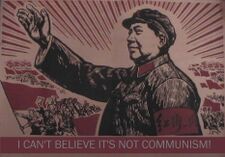
For a while, Brown's poll ratings perked up like a man popping Viagra, but then all the old doubts re-emerged on whether a Labour Prime Minister was right for the job. Stories of him throwing office equipment and biting off fingers led to many plots against his life. But Brown had the ringleaders taken out into the garden of № 10 and shot. His lasting legacy was making Britain the "best place to weather the great recession of 2009" (when he "saved the world" too); although the trillion-pound debt the nation's grandchildren will be enslaved to repay is a minor point of contention.
Following the 2010 General Election (won by no one, but Labour even less than the Tories (although Nick Clegg was able to ride into power on David Cameron's coattails)), Broon fae Troon decided to step Doon. Harriet was given the official Labour trousers to wear, which she kept on until September 2010, when the Labour party elected Ed Miliband, an Animatronic model of his older brother David.
Ed's election surprised many commentators, as David was expected to win. However, Ed tactically outwitted his brother by promising a concession to the trade unions: Ed, when elected, would reintroduce the "Beer and Sandwiches" meetings at No. 10 with trade union leaders. The original Beer and Sandwiches meetings date back to the Wilson government of the mid-1970s, but fell out of fashion with the election of the Thatcher government in 1979, as Mrs Thatcher preferred to delegate negotiation, so that it would take place directly between a police baton and the heads of 'striking' miners. Mrs Thatcher disliked beer and smelly working classes, preferring battery acid.
A secret plan was also hatched to wrong-foot the Conservative party. As Ed looked too young to have done anything dangerous before 2010, he became the Labour party's new leader. Ed has a unique talent: After decades in which Britons have learnt that the way to tell that a politician is lying is whenever 'his or her lips move,' it was a Godsend to find a politician who talks through his nose as Ed does. This is especially hard when eating a bacon sarnie.
Recent developments
In 2015, the Labour Party expected to win with #EdMilibandPremiere. They were defeated and lost all but one of their seats in Scotland and a few comfy sofas in England. Shadow Chancellor Ed Balls lost his seat and his pants, as Britain lost its Balls. Miliband resigned and left the country disguised as a bearded professor.
The Labour party was then put on Ebay. In a frenzy of underbidding, the party was bought for £1.00 by a real Beardie, Jeremy Corbyn. He has announced plans to merge the party with the Monster Raving Loony Party to avoid fighting an electoral rival. This didn't happen and after losing the 2019 General Election Corbyn resigned. He was replaced Mr Dull-but-Sensible Keir Starmer. Beards and Marxism were out. Labour went on to smash the Tories in 2024.
Ideology
The Labour Party has been noted for its clear and consistent use of principles throughout the party's lifetime. These principles can be broken down into different filing cabinets for each individual Oxford-educated PR executive who works in the party. The process of coming up with each policy the Labour Party puts forward is highly democratic. An ex-marketing advisor to a flailing IT firm is hired and uses their experience and natural intellect to guess what policies everyone once. The policies are then run through an American political spin doctor, who uses their experience in freedom land to make sure that the policies adhere to freedomness.
Aspiration
In reaction to the growing evidence suggesting that the British public can stop respiring during their lives, Labour realised that there was an opportunity to exploit this fact with a policy. Thus they invented aspiration, a technique that can be used once a person has stopped respiring. Biologically speaking, aspiration is a physiological process that occurs in the blood streams of the human anatomy in which red blood cells are completely removed from the body and white blood cells replace them. Red blood cells are only needed for respiration, but once a person fails to respire and becomes dead inside these cells are no longer needed. Liz Kendall was one such famous Labour MP who actually managed to achieve the state of aspiration.
Fairness
Fairness is a Labour policy named after a wild and lonely loch on the Western edge of Scotland. This was the location of the famous Fairness dispute between a white Scotsman and the only black Scotsman in the entirety of Scotland. The outcome of the dispute was a victory for the black Scotsman who managed to scare the Fairness monster out of ever cheekily appearing again in the background of a hazy photograph. Labour adapted this experience to suggest that black people be used to cull British wildlife such as badgers, and so replacing the needless systematic killing of these animals with the horrific racial humiliation of an entire race of humanity.
War
The Labour Party has a famous history of rebellious backbenchers, who turn the tide of Labour policy and help the Tories get their policies through instead. Thus the party holds itself up as without a unified, dictated agenda and instead as a bunch of MPs who will vote the way they feel, usually producing an incoherent, drunken front to any parliamentary action. In the Labour Party this was previously known as warrantless, but after realising that with all the disputing and bickering that occurs in the party the description rantless would be an insult to those who voted for that policy, they simply dropped it from warrantless and stuck with the word produced - war - as their policy name.
Why do so many people vote Labour?
Social scientists investigating the strange phenomenon of seemingly sensible people voting Labour attribute it to several factors:
- Literate working-class voters read on the Labour Party website's history page that the party was founded by ordinary working folk who wanted a rainbow land for all and that it has never had any association with the rich and powerful — least of all the James Bond villain Peter Mandelson.
- Some middle-class voters choose Labour because they love the great taste. They note that when voting Labour it makes them feel twenty years younger as they are reminded of their youth in the International Marxist League.
- Illegal immigrants vote Labour after reading in the Daily Mail that Labour were planning to give each of them a billion pounds a year and a free palace. In contrast, voters who actually subscribe to the Daily Mail vote Labour so that they can have something to whinge and moan about.
However, the most popular reason to vote Labour is "To spite the Tories — those bastards", which presumes that a Labour government cares more about people than a Conservative one does, and so if you aren't a Labour member, no one will Friend you on Facebook.
No one tries to point out the lack of a difference between the two parties, because that would be treason to the Working Class.
Footnotes
- ↑ Rather like Gordon Brown, only jolly. And with a hearty laugh and generous smile
- ↑ How come no conspiracy-theories about how TORY B.LIARS killed John Smith to take power, eh? One doesn't see much of that on YouTube.
- ↑ Marketing experts argue that the Blair faction should be re-branded "Then-New Labour", the Brown faction should be "Brown Labour" and the rest should be "New Miliband for the Milennium [sic]." The pre-1994 Labour Party would be termed "Labour Classic."
See also
| Featured version: 29 October 2015 | |
| This article has been featured on the main page. — You can vote for or nominate your favourite articles at Uncyclopedia:VFH. | |
